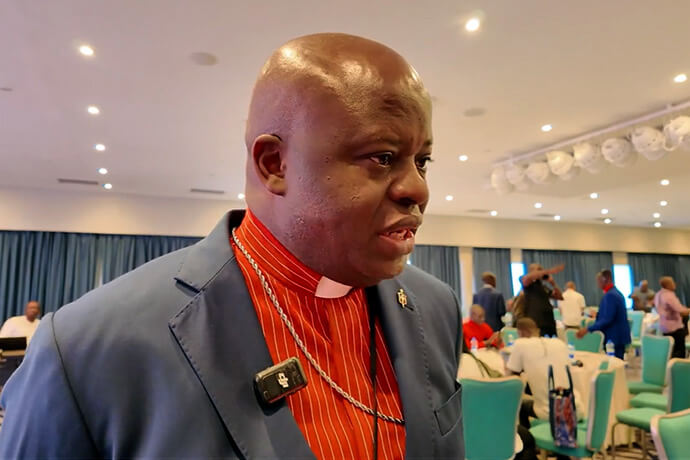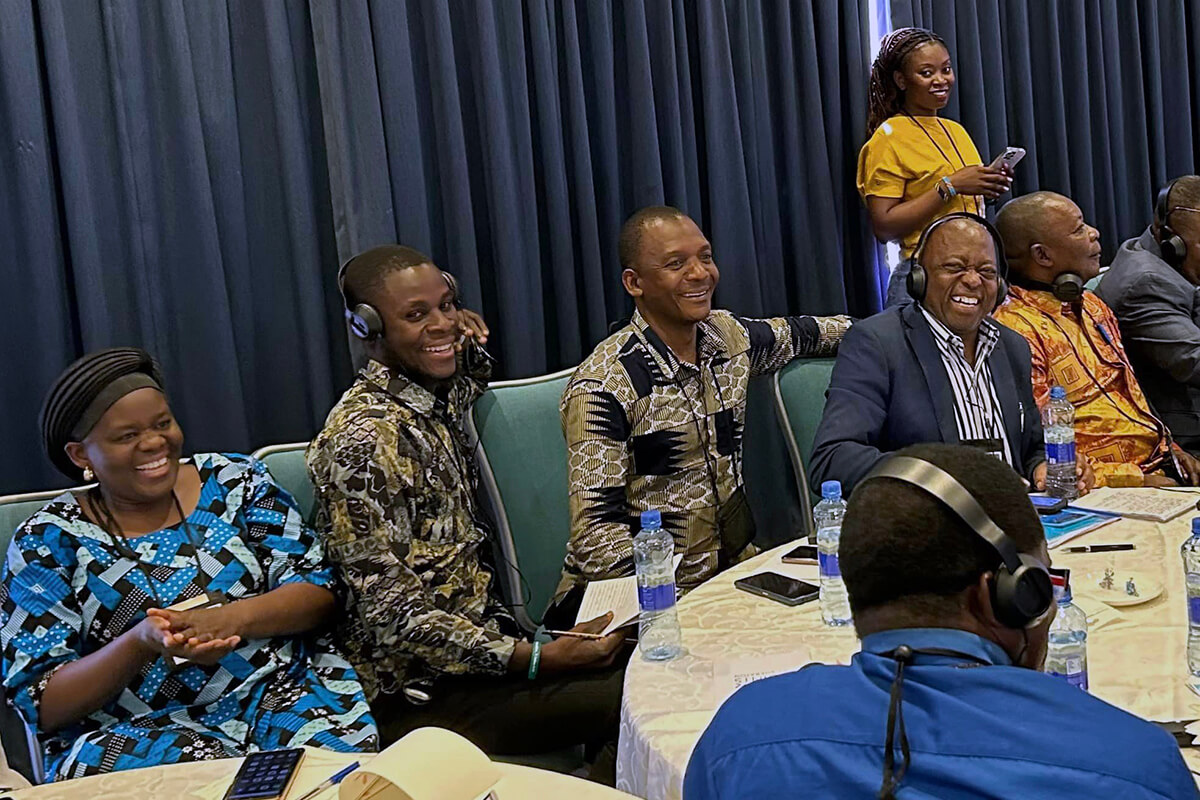Key Points
- United Methodists from across Africa gathered for training on communications and regionalization.
- Regionalization requires amending the denomination’s constitution, and annual conferences will vote on the amendments next year.
- Many at the training have been contending with disinformation about the proposal and the church in general.
You don’t get much more biblical than the concept behind regionalization.
That was Bishop Mande Muyombo’s message about the proposal that would give The United Methodist Church’s different geographic regions equal decision-making authority.
“Throughout the Bible, God has recognized the diversity of cultures and nations included in the diversity in God’s redemptive plan for humanity,” Muyombo said.
“And God allowed for decision-making structures that take such diversity into account.”
The bishop was speaking to more than 80 African United Methodist communicators and other church leaders gathered in the bustling Tanzanian port city of Dar Es Salaam for back-to-back training sessions in mid-October on communications and regionalization. The training was led by United Methodist Communications — the agency that includes UM News — in collaboration with the Council of Bishops and the Connectional Table, a leadership body that coordinates the denomination’s ministries and resources.
Subscribe to our
e-newsletter
Muyombo leads the North Katanga Area that encompasses both Tanzania and parts of Congo. He also is the president of the Africa Colleges of Bishops and the chair of the Connectional Table that helped develop the regionalization legislation.
Under regionalization, the central conferences — church regions in Africa, Europe and the Philippines — as well as the United Methodist presence in the U.S. would each become regional conferences.
Each regional conference would have equal power and freedom to adapt parts of the Book of Discipline, the denomination’s policy book, to their missional needs. The legislation seeks to strengthen the central conferences’ existing authority to adapt the Discipline by spelling it out in detail in the denomination’s constitution.
At heart, Muyombo sees regionalization as a step toward decolonizing The United Methodist Church. For too long, he said, The United Methodist Church has organized itself as a U.S.-based denomination with missional outposts beyond U.S. shores.
“If you look at our history from the 1920s to today, the progress that we are making is recognizing that we are equals,” Muyombo said. “So there’s no longer a center and a periphery. The only center we have now upon whom we draw all our energy is Jesus Christ, our Lord and Savior.”
The United Methodists he addressed represented multiple countries and spoke multiple languages — exemplifying the cultural diversity regionalization is intended to serve. However, many in the bishop’s audience have been contending with the spread of disinformation especially about regionalization — falsely equating the plan with promoting acceptance of homosexuality.
In fact, the regionalization legislation explicitly allows each regional conference to make its own decisions about whom to marry and whom to ordain in line with local laws and the conference’s understanding of Scripture.
Much of the disinformation comes as recruitment for the newly formed Global Methodist Church has ramped up on the continent. The United Methodists gathered in Dar Es Salaam are committed to staying with the denomination.
The regionalization training on Oct. 16-17 aimed to equip these church leaders with the correct information in explaining what the legislation does and does not do. That entailed debunking some of the falsehoods about the plan with facts.

Regionalization has a biblical basis
Muyombo gave a presentation on the biblical and theological foundation of worldwide regionalization.
Readers of the Old Testament know that ancient Israel operated as a tribal federation, the bishop pointed out. Even after King David brought the 12 tribes together, each tribe still maintained regional authority with elders making decisions.
“The power of elders to make decisions in their own context was not intended to separate the tribes of Israel,” Muyombo said. “And I think this is where we, as Africans, we understand how the wisdom of elders is important.”
The theme of maintaining connection in faith amid cultural diversity continues into the New Testament as well, the bishop said.
He pointed to the Council of Jerusalem, described in Acts 15, which resulted in early church leaders determining that Gentile Christians could be saved in Christ without being circumcised. In this way, the early church opened its doors to varied practices and, in doing so, resolved what had been its fiercest debate.
“So if you ask the question: ‘Can we be in one church with those who have different practices?’ Yes, as long as we have one faith.”
He noted that United Methodists continue to share one faith as outlined in the Apostles’ Creed.
Training shows communications’ importance

Regionalization does not promote homosexuality
Easily the fiercest debate within The United Methodist Church in recent decades has been over its stance on homosexuality and the place of LGBTQ people in church life. That debate has already led to church disaffiliations in the U.S. and the planned departures in Eurasia and Africa.
The same General Conference that earlier this year moved forward the regionalization proposal also eliminated denomination-wide bans on same-sex weddings and gay clergy. The fact that these were denomination-wide is key. United Methodists will still be able to determine their own policies but closer to home.
The denomination’s international legislative assembly also added explicit protections for clergy so that they will not be compelled to perform any wedding or blessing that goes against their conscience. Similarly, General Conference passed legislation allowing central conferences to set their own standards for marriage and clergy ordination.
The worldwide regionalization legislation spells out that regional conferences will have that same authority as well as the freedom to determine what counts as a violation of church law. The hope is that with regionalization, The United Methodist Church will no longer debate LGBTQ matters at the General Conference level.
Muyombo stated throughout the training that he would not allow same-sex weddings in any area he leads. He also gave a historical overview, explaining that the forerunners of The United Methodist Church have been discussing the possibility of regionalization for a century — far longer than the debate over homosexuality, which dates to 1972.
“Questions about regionalization have historically been about the mission and ministry of the church,” the bishop said. “So what I really hope our people understand is that you cannot demean regionalization to only the issue of sexuality.”
Regionalization will not sever the connection
The United Methodist Church is defined by its sense of connection, and regionalization will not change that.
The United Methodist Church worldwide will continue to be connected through General Conference, the Council of Bishops and the Judicial Council, the denomination’s top court. The denomination will continue to have general agencies that provide resources for the whole church.
The Discipline also will continue to include sections that are unadaptable, including the denomination’s doctrinal statements on core Christian beliefs in the Trinity, the sacraments and Christ’s resurrection.
“Regionalization is missional,” Muyombo said. “Missional theology has shifted away from an understanding of mission that equates Christianity with Western culture — and toward an understanding of mission that recognizes that all cultures are equally valid.”
Regionalization's fate will be up to voters
United Methodists across the African continent and around the globe will soon have their say on whether regionalization takes effect. To come to fruition, regionalization requires amending The United Methodist Church’s constitution.
This year’s General Conference took the first step toward regionalization’s passage. The denomination’s international lawmaking assembly approved the amendments with a 78% vote, exceeding the required two-thirds threshold.
To be ratified, constitutional amendments also must receive at least two-thirds of the total votes taken at all 131 of the denomination’s annual conferences around the globe. The central conferences as well as the United States each contain multiple annual conferences — geographic bodies consisting of multiple congregations and ministries.
Put another way, the threshold for passage is not a two-thirds vote at each annual conference, but two-thirds of all annual conference votes. The Council of Bishops expects all annual conferences to vote on the amendments by the end of 2025. The bishops plan to tally the votes when they hold their spring meeting in 2026.
Many African communicators expressed gratitude to be part of the gathering and learn from colleagues and others at the back-to-back training.
Judith Osongo Yanga, the East Congo Area’s director of communications and a contributor to UM News, said she sees her role as explaining The United Methodist Church to all people.
“I have this opportunity to be a delegate for the General Conference, where I learned about regionalization,” she said. “To come here is also a second opportunity for me to have another understanding of regionalization. That’s why I’m very, very happy to have some opinion from Africa.”
Talking to her fellow communicators, she said, will give her other ways to explain regionalization.
Lewis Teah Togba Sr., director of communications for the Liberia Annual Conference, said the information and discussions will help strengthen the conference’s approaches to telling the good news about The United Methodist Church in Liberia.
“The rich historical analysis and deep understanding of the long history of regionalization and The UMC by the president of The United Methodist Church African Colleges of Bishops, Bishop Mande, even widened our perspective on the issue,” Togba said.
Hahn is assistant news editor for UM News. Contact her at (615) 742-5470 or newsdesk@umnews.org. To read more United Methodist news, subscribe to the free Daily or Friday Digests.



